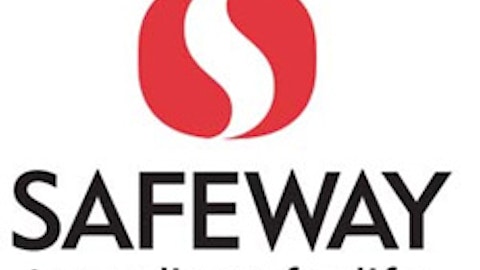This series, brought to you by Yahoo! Finance, looks at which upgrades and downgrades make sense, and which ones investors should act on. Today, our headlines feature an upgrade for AMC Networks Inc (NASDAQ:AMCX), and a better price target for Guess?, Inc. (NYSE:GES), but for The Fresh Market Inc (NASDAQ:TFM), it’s…

Time to mark down the day-old produce
Whole Foods wannabe The Fresh Market Inc (NASDAQ:TFM) reported earnings last night, and its stock is getting roundly punished for the numbers this morning. Shares are down 8%, and counting, on news that the company missed sales estimates, merely met expectations on second-quarter earnings ($0.32 per share), and is looking at either missing, or missing badly, analyst expectations for full-year earnings as well.
The Fresh Market Inc (NASDAQ:TFM) says fiscal 2013 profits per share will likely range from $1.50 to $1.55, versus consensus expectations of $1.59 a share. Partly in response to this bad news, and partly as a simple exercise in “taking profits” after the stock’s 33% outperformance of the market over the past six months, investment megabanker UBS decided today to cut its rating on The Fresh Market Inc (NASDAQ:TFM)– taking the stock down one notch to “neutral,” and leaving its $1.56-per-share price target unchanged.
This, however, is quite literally the least UBS could do. What it should have done is downgrade the shares to “sell.” Here’s why:
The Fresh Market Inc (NASDAQ:TFM) currently costs 35 times earnings, pays no dividend, and is expected to post growth rates of about 20% per year over the next five years. Now, 35 times earnings is already a pretty rich price to pay for 20% growth — let alone the fact that yesterday’s guidance shows us the company is already falling short of growth expectations. Factor in the fact that TFM’s cash flow statement shows that the company produced only $17.7 million in real free cash flow over the past year, versus a reported $69.3 million in GAAP “profit,” and this company is already a whole lot less profitable than meets the eye.
At a price-to-free cash flow ratio north of 135, The Fresh Market Inc (NASDAQ:TFM) shares look as overpriced as its wares.
Guess?, Inc. (NYSE:GES) these shares are going up?
A second retailer reporting earnings yesterday — and good earnings this time — was Guess?, Inc. (NYSE:GES). The company reported fiscal second-quarter 2014 profits of $0.52, which was $0.16 ahead of estimates, on revenues that likewise trumped expectations.
Here, too, though, investors were met with curbed expectations for the future, as Guess?, Inc. (NYSE:GES) warned that same-store sales declined 2% in the second quarter, and predicted it will earn only $0.34 to $0.38 in the current third fiscal quarter, versus expectations of $0.40.
Investors are forgiving Guess?, Inc. (NYSE:GES) this last bit of bad news, however, and hanging their hopes on the fact that the second quarter’s surprising profits haul will help lift the company as high as $1.92 per share in full-year earnings, a number that — if it happens — will exceed estimates for $1.79-per-share profits.
This hope probably lies behind Telsey Advisory Group’s decision to up its price target on Guess? this morning, to $30. On the other hand, though, even $30 isn’t a particularly high hurdle to clear for Guess, given that its shares now cost $30.65 after today’s run-up. So… is the stock worth it?
It’s hard to say. At first glance, paying $30 for a stock expected to earn $1.92 at the high end results in a not-too-expensive 15.6 current-year P/E ratio at Guess?, Inc. (NYSE:GES). On the other hand, though, long-term expectations call for the company to continue growing at a much more modest pace — only about 7% annually over the next five years. Even with a hefty 2.8% dividend yield, that sounds pricey.
What may swing the equation in Guess?’ favor is the fact that the company has been doing an excellent job of generating cash from its business lately. Free cash flow for the past 12 months came to $227 million, or 43% more than the company’s $159 million in reported GAAP earnings suggest. On balance, I think the resulting price-to-FCF ratio of 11.5, which is made even cheaper when factoring in the company’s $300 million net-cash position, makes Guess? shares look reasonably priced today — yes, even after the stock’s 12% run-up.
And if Guess? should somehow manage to grow its profits at faster than 7% going forward? Why, then, the stock might even be cheap.
And speaking of cheap…
Finally, we turn to AMC Networks Inc (NASDAQ:AMCX). The stock of the company that makes The Walking Dead is looking quite healthy lately. Its 18.5 P/E ratio is a price that both Mad Men and sane investors can probably agree is reasonable. It’s little wonder, therefore, that this morning, analysts at B. Riley announced they were upgrading the shares to “buy.”
But should we? Buy the stock, that is?
As a fan of the network’s shows, I’m inclined to throw caution to the wind, and go ahead and buy the stock solely on the strength of its product — however, there are still good reasons to be leery of AMC Networks Inc (NASDAQ:AMCX). The company carries a heaping helping of debt, for one thing — $1.7 billion net of cash. Its free cash flow, $237 million for the past year, lags reported net income by about 5%. And of course, AMC Networks Inc (NASDAQ:AMCX) pays its shareholders no dividend.
Long story short, even if AMC Networks Inc (NASDAQ:AMCX) lives up to analyst expectations for 20% annualized profits growth, the stock’s no obvious bargain at today’s prices. Personally, I’d advise letting this one decompose a bit longer. For now, it’s only mostly dead, and still not buried deeply enough to grow into a profitable investment for new buyers.
The article Thursday’s Top Upgrades (and Downgrades) originally appeared on Fool.com and is written by Rich Smith.
Fool contributor Rich Smith has no position in any stocks mentioned. The Motley Fool recommends AMC Networks, Guess?, The Fresh Market, and Whole Foods Market. The Motley Fool owns shares of Guess? and Whole Foods Market.
Copyright © 1995 – 2013 The Motley Fool, LLC. All rights reserved. The Motley Fool has a disclosure policy.



